Inspectable Item: Fences and Gates
Notes
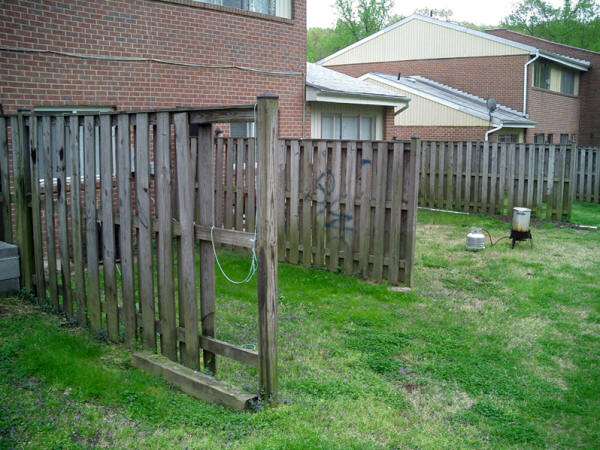
The fences here are NOT designed to keep people in or out.
By definition, these are not security fences, and must therefore be evaluated as Non-Security Fences.
Damage would have to affect 25% of such fencing before this would reach the minimum threshold for a Level 2 deficiency - the only choice for Non-Security Fences and Gates.
If cited, we would measure the areas of damage, calculate the percentage, and appeal if it was less than 25%.
In the early days of the REAC inspection, there were three different Fences and Gates deficiencies:
- Missing Sections/Gates;
- Holes; and
- Damaged/Fallen/Leaning
An inspector could conceivably cite all three defects on the same fence, and this could result in scoring deductions as high as 15 to 19 points!
REAC resolved this in 2013 with the change to the RAPID 4.0 software and definitions, combining those three defects into one. In a world of common sense, this new, combined defect would have been called Fence Damage.
In the world of REAC inspections, it was decided the defect would be called Holes/Missing Sections/Damaged/Falling/Leaning.
This might have seemed too simple, however, so REAC split this new combined defect into two distinct defects, one each for fences that have a safety and/or security function and fences that do not.
These two new defects are called:
Holes/Missing Sections/Damaged/Falling/Leaning - Non-security/Non-safety Fences
(The defect shown above)
and
Holes/Missing Sections/Damaged/Falling/Leaning - Security/Safety Fences
(The defect shown below)
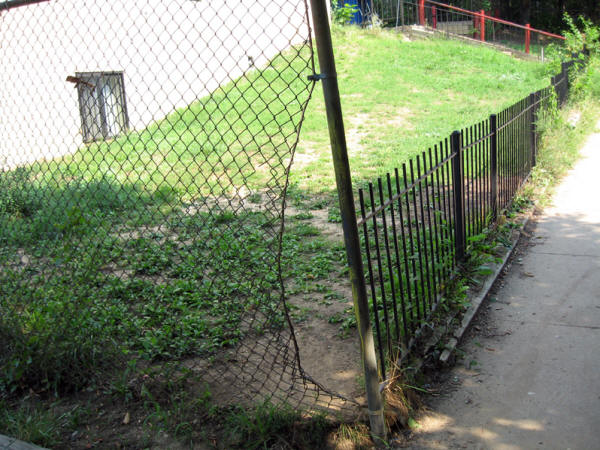
It is a pretty simple matter to determine that this is indeed Level 3 damage to a Security Fence.
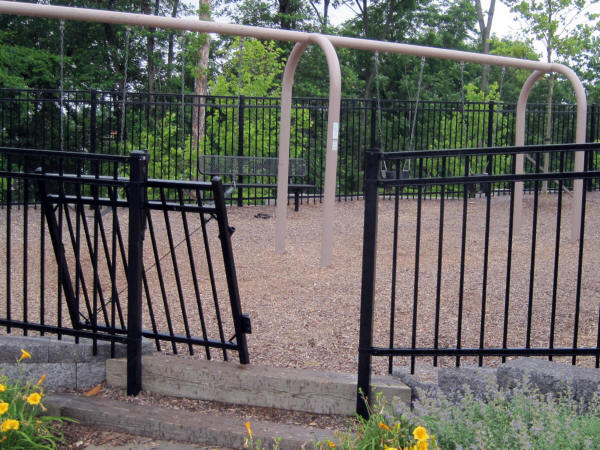
It simply means that the object is missing from the exact location where it really should be.
This gate is "missing" from the hinges upon which it should be hanging.
It's a missing gate, also known as a missing section of fence, and this is also a Level 3 Security Fence defect.
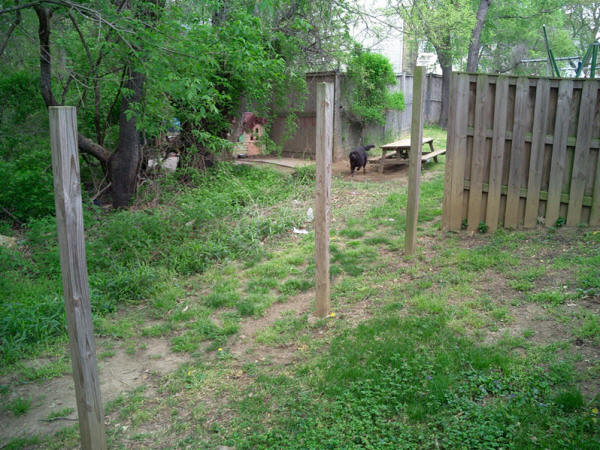
In this photo, the presence of fence posts indicates that sections of fence are missing.
If you have an area where fencing has been removed, take down the fence posts, all hardware and attachments, and make it look pretty much as though no fence ever existed.
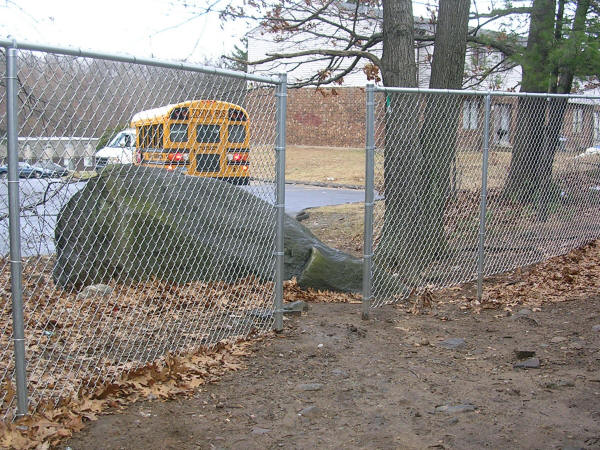
Children used to have to walk all the way around the fence, out along a busy highway to get to school.
At some point, a parent cut a hole in the fence - which was cited as damage.
Rather than being angry, the owner realized that this was for the safety of the kids, and he had his fencing contractor open the fence and create this neat, permanent opening for the kids to cut through to school.
This is NOT a defect, even though there is not a gate. There are no hinges or attachments - nothing here to indicate that a gate belongs here.
| Fencing and Gates (Site) |
| Fence: A structure functioning as a boundary or barrier. An upright structure serving to enclose, divide or protect an area. |
| Gate: A structured opening in a fence for entrance or exit. |
| Note: This does not include swimming pool fences or gates. Swimming pool fences and gates are covered under “Pools and Related Structures (Common Areas).” |
| This inspectable item can have the following deficiencies: |
| Holes/Missing Sections/Damaged/Falling/Leaning—Non-Security/Non-Safety |
| Holes/Missing Sections/Damaged/Falling/Leaning—Security/Safety |
| Holes/Missing Sections/Damaged/Falling/Leaning—Non-security/Non-safety (Fencing and Gates—Site) |
| Deficiency: A non-security/non-safety (for example, privacy/decorative) fence or gate is rusted, deteriorated, uprooted, missing or contains holes. |
| Note: |
| 1. Gates for swimming pool fences are covered in another section, “Pools and Related Structures (Common Areas).” |
| 2. Fences designed for security/safety are addressed under “Holes/Missing Sections/Damaged/Falling/Leaning—Security/Safety (Fencing and Gates—Sites).” |
| Level of Deficiency: |
| - Level 1: N/A |
| - Level 2: A non-security/non-safety fence or gate contains holes or deterioration/damage in greater than 25% of a fence. |
| - Level 3: N/A |
| Comment: |
| - Level 2: If the non-security/non-safety fence poses any danger, note this as a health and safety issue under “Hazards (Health and Safety).” |
| Holes/Missing Sections/Damaged/Falling/Leaning—Security/Safety (Fencing and Gates—Site) |
| Deficiency: A security/safety (i.e., perimeter/security) fence or gate is rusted, deteriorated, uprooted or missing such that it may threaten security, health or safety. |
| Note: |
| 1. Do not evaluate the fence under this item if the fence or gate is not designed for security/safety, such as keeping intruders or children out. Refer to “Holes/Missing Sections/Damaged/Falling/Leaning—Non-Security/Non-Safety (Fencing and Gates—Sites).” |
| 2. Security/safety fences include perimeter fences that are designed to keep people in and/or out as well as fences around playgrounds, etc. |
| 3. Fences less than 4 feet in height are to be addressed under non-security fences. |
| 4. Gates for swimming pool fences are covered in another section, “Pools and Related Structures (Common Areas).” |
| Level of Deficiency: |
| - Level 1: A security/safety fence or gate contains small holes or related damage as defined above (smaller than 12 inches by 12 inches) in less than 25% of the fence. |
| - Level 2: A security/safety fence or gate contains small holes or related damage as defined above (smaller than 12 inches by 12 inches) in more than 25% of the fence. |
| - Level 3: A security/safety fence or fence section contains large holes or related damage as defined above (greater than 12 inches by 12 inches) or is missing a section. |
| Note: If the fence can cause injury or allow bodily harm, record it under “Hazards (Health and Safety).” |
Compilation Bulletin 4.0 v. 2, page 23
1. A security/safety fence could be either an exterior or interior fence but its intended purpose is to provide safety and security for the property residents and must be at least four feet high. Fences less than four feet high are considered non-security/non-safety fencing.
2. If a property has fencing along its perimeter acting as a security/safety fence, whether or not it is owned by the property, the fencing must be inspected for deficiencies. This does not apply to non-security/nonsafety perimeter fencing.
3. A privacy fence that is used for privacy of an individual unit is considered as non-security/non-safety fencing.
Effective date: May 23, 2016
No defect.